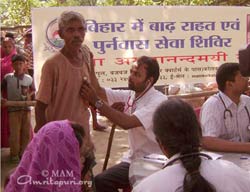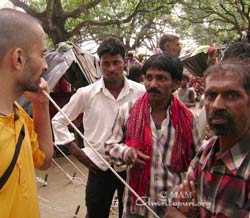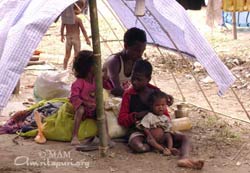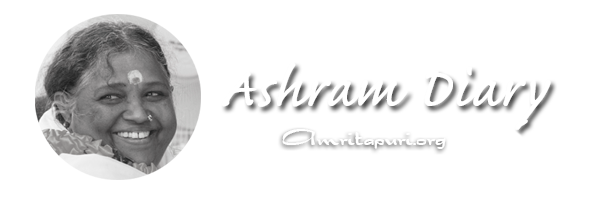 7 Sep 2008, Bihar
7 Sep 2008, Bihar
The second day of camps. We went to Banmankhi – opposite in direction to Bhawanipur where we went yesterday. It was a camp of ramshackle huts – made of bamboo and plastic in most part. Again the same scenes of poverty and lack.
When we reached there and were setting up a sort of enclosure for our doctors a few of the local people came over to talk. Maybe the colour of our clothes held some special meaning for them.
Stories of how the water rushed in at mid-night, how they all scrambled for their lives, how they lost track of members of their family, how they just cut loose their live-stock so that they would at least have a chance of survival. And how there was nothing left to return to – nothing at all. They did not expect to find their livestock alive, their crops had been destroyed, their lands covered with silt and they were left with no seeds to start over again – all they had was the clothes they were wearing.

Manoj Kumar was one of those who came to talk. He had been living with his family in a small brick house in Madhepura district. Some organisation had made proclamations that the world would end by 2012 and he had in his simplicity accepted that – so he dreamed of spending the next four years living peacefully with his family, happy in their simple existence.
“The waters came rushing in at night and within a few moments it was rose swiftly above the waist. Many people climbed on our house to escape and there was nothing we could say to them. With the weight of all these people the house suddenly collapsed into the now swirling waters. Almost all of the people died. My wife was holding our two children and trying to get to higher ground, she just put one step up to climb up when a snake swept by the waters bit her on her leg and she collapsed. My sister was trying to hold her child above the waters, but the waters were ever rising – it swept over her head and she had to let go off the child, she does not know how to swim. She clung to me and I somehow dragged her along with me. If she had held on to her child we would both have drowned.”
 “Now we are here. I wonder why we live. Would it not be easier to take some poison and sleep for ever? What do I live for? What is left? But my sister is strong, she always tries to raise my spirits. When I talked to her of dying she slapped me and said, “the rest have died. We are the only two alive. We have to live. Trying to escape by dying is cowardice. Those who have nobody else have God, he will look after us.”
“Now we are here. I wonder why we live. Would it not be easier to take some poison and sleep for ever? What do I live for? What is left? But my sister is strong, she always tries to raise my spirits. When I talked to her of dying she slapped me and said, “the rest have died. We are the only two alive. We have to live. Trying to escape by dying is cowardice. Those who have nobody else have God, he will look after us.”
“I have done no harm to anybody in my life. I am honest. I do not know why this happened to me, but I pray to God that this does not happen to anyone else.”
“Baba*, this is the first time I have smiled after the incident. I feel better after having talked to you.”
Maybe Amma reached out to him.
Here and there we see stray banners and small camps run by organisations other than the government but they are few. The local people, of course, are doing what they can. But there seems to be no other organisation working in such a planned and comprehensive manner at present. The local politicians, bureaucrats, villagers, the flood affected – have all expressed their appreciation of the work that Amma is doing in this area.
– Nijamrita
(* in North India they address a Swami as Baba)


Leave a Reply
You must be logged in to post a comment.